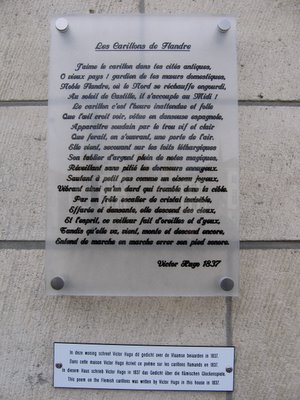 Within this city of 80,000 people stands the world’s first carillon school, the Royal Carillon School “Jef Denyn”. It offers a “Practical Diploma” and the final “Laureate’s Diploma.” Three American students are pursuing the typically seven-year Laureate’s Diploma in one year: Tom Lee and myself (recent Yale Guild alumni) and John Bordley (Sewanee). Each week, we take lessons in carillon performance, composition, and campanology. For composition, students write a set of variations and an original piece, both of which they perform for their final exam recital. A thirty-page thesis on a historical, cultural, or technical aspect of campanology is written with individual guidance. Basic musicianship courses in choir and piano are also mandatory.
Within this city of 80,000 people stands the world’s first carillon school, the Royal Carillon School “Jef Denyn”. It offers a “Practical Diploma” and the final “Laureate’s Diploma.” Three American students are pursuing the typically seven-year Laureate’s Diploma in one year: Tom Lee and myself (recent Yale Guild alumni) and John Bordley (Sewanee). Each week, we take lessons in carillon performance, composition, and campanology. For composition, students write a set of variations and an original piece, both of which they perform for their final exam recital. A thirty-page thesis on a historical, cultural, or technical aspect of campanology is written with individual guidance. Basic musicianship courses in choir and piano are also mandatory.Students must perform a short midterm exam in December and a final exam recital of about 45 minutes in June. Because European carillons call for different repertoire than those in North America, foreign students may find themselves immersed in a repertoire quite separate and challenging from what they have played before. In perhaps no other musical discipline is accessibility to historical instruments so open—playing centuries-old carillons is easy to arrange.
The student association Campana organizes several outings to carillons, museums, and foundries, but overall student interaction is limited to the school day as most people commute, including a high number of foreign students. Students usually take classes two days per week and are otherwise free to practice, research, and travel. Travel is irresistible—it is affordable, and utterly different cultures are just hours away.
Mechelen is a small but culturally rich city in which everyday conveniences are within walking distance and cycling is often preferred to driving. Brussels and Antwerp are fifteen minutes away by train and well worth getting to know. The Flemish government offers free Dutch language courses, and city life is rich with cultural festivals and early music concerts, as well as Belgium’s famed cuisine. You may soon find your wallet slimming as your waistline expands from heavy intake of chocolate, waffles, fries, and Belgian beer. And you will gradually adjust to a slower pace of life in which savoring a meal with company for several hours and closing stores promptly after work and on Sundays is more important than reaping profits. Nevertheless, Belgium enjoys one of the highest standards of living in the world.
The Royal Carillon School is in an exciting time of transition, finalizing joint programs with the Netherlands Carillon Institute (Boudewijn Zwart) and the Dutch Carillon School in the Netherlands and the International Carillon Institute (Tim Hurd) in New Zealand. By the end of the year, an accredited bachelor’s degree in carillon will be jointly available with a partner conservatory.
For more information, attend the education panel at the 2006 GCNA Congress and keep your eyes on the Royal Carillon School’s website. I am translating it into English, and for my thesis, cataloging and building an online multimedia version of the school’s Carillon Museum: www.beiaardschool.be.
No comments:
Post a Comment